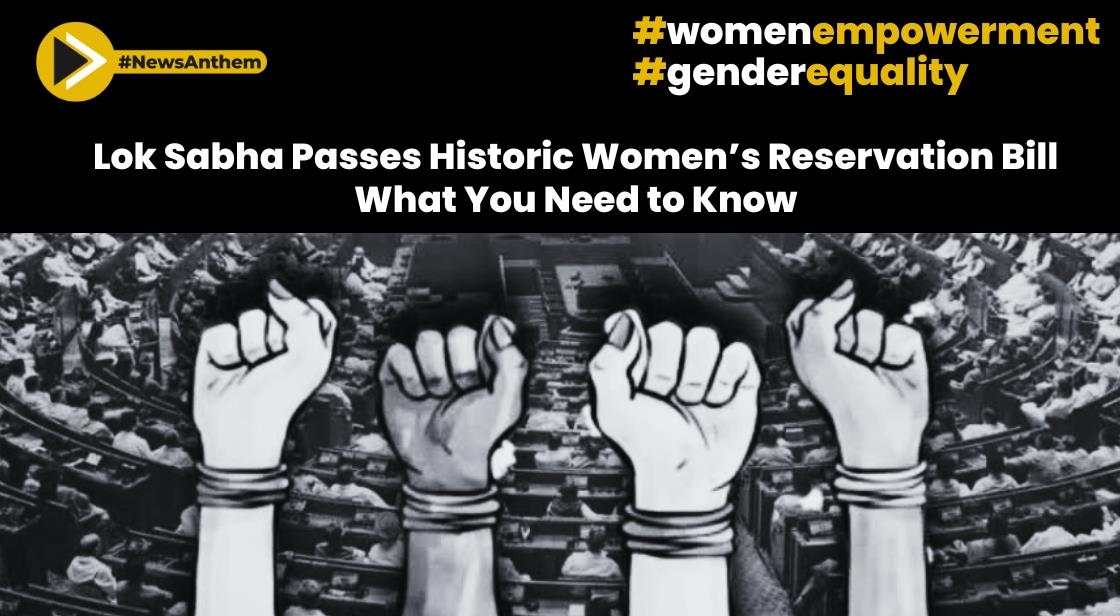Lok Sabha Passes Historic Womens Reservation Bill: What You Need to Know

News Synopsis
In a significant move, the Lok Sabha has approved the Women's Reservation Bill with an overwhelming majority of 454 votes, marking a historic step toward gender equality in Indian politics,
The Nari Shakti Vandan Adhiniyam seeks to allocate 33% of parliamentary seats to women, both in the Lower House of Parliament and state legislative assemblies.
However, while this development is a cause for celebration, the implementation of this transformative law may still encounter hurdles in the years to come.
The Landmark Decision:
The Lok Sabha resoundingly voted in favor of the Women's Reservation Bill, with 454 Members of Parliament (MPs) supporting the legislation. This historic moment has the potential to reshape the political landscape of India and empower women in decision-making positions.
A Long-Awaited Reform:
The journey of the Women's Reservation Bill dates back to 1996 when it was first introduced. However, despite multiple attempts, its passage had been blocked on numerous occasions. The bill's recent approval signifies a significant leap forward in the quest for gender parity in Indian politics.
Path to Becoming Law:
While the Lok Sabha's endorsement of the bill is a crucial step, the Women's Reservation Bill must clear further hurdles. It now awaits approval from the parliament's upper house and at least half of India's state assemblies before it can become law.
Implications for Gender Representation:
Currently, India has a glaring gender disparity in Parliament, with only 104 women MPs out of nearly 800, according to official figures. The Women's Reservation Bill seeks to address this disparity by reserving a third of seats for women, potentially increasing their representation significantly.
Challenges and Criticisms:
Despite the bill's positive reception, it has not been without controversy. Critics have raised concerns about the absence of reservation for Other Backward Classes (OBCs) and the Muslim community.
The debate over whether the bill can truly expedite gender parity while addressing these concerns remains a topic of discussion.
Census and Delimitation Awaited:
The bill's implementation is tied to the completion of the 2021 census, which has been postponed indefinitely due to the COVID-19 pandemic. The delay has led some opposition leaders to question the government's commitment to this initiative, labeling it an "election jumla" aimed at grabbing headlines.
The Way Forward: In response to concerns, Home Minister Amit Shah emphasized the importance of supporting the bill, highlighting that withholding support would not expedite reservations for OBCs and Muslims.
He reiterated that the census and delimitation exercises would follow soon after elections, ultimately providing women with a more significant voice in Parliament.
Key points of the Women's Reservation Bill are as follows:
-
India currently has a mere 104 women MPs (out of nearly 800) as per official figures.
-
The quota will only take effect once India conducts the 2021 census, which has been postponed indefinitely amid the COVID-19 pandemic.
-
No timeframe has been given for the census and delimitation exercise – and in turn for the start of women's reservation.
-
Home Minister Amit Shah has said that the census and delimitation exercises will be conducted soon after the elections, and women will have a greater voice in the Parliament.
-
Reservation of 33% seats for women in the Lower House of Parliament (Lok Sabha) and state legislative assemblies.
-
The quota will be implemented through a system of rotation, with seats being reserved for women in different constituencies in each election cycle.
-
The bill also provides for reservation of seats for women from Scheduled Castes (SCs) and Scheduled Tribes (STs) within the overall quota of 33%.
-
Existing women MPs and MLAs will not be affected by the bill.
-
The bill will come into effect once it is passed by both houses of Parliament and at least half of the state assemblies.
Benefits of the Women's Reservation Bill:
-
Increased representation of women in politics: The bill will help to increase the number of women in elected office, which will lead to greater representation of women's interests and perspectives in decision-making.
-
Improved gender equality: The bill will help to promote gender equality by ensuring that women have a greater voice in politics.
-
Better governance: Studies have shown that women's participation in politics leads to better governance outcomes. For example, studies have found that women are more likely to focus on issues such as education, healthcare, and social welfare.
The Women's Reservation Bill is a landmark piece of legislation that has the potential to transform Indian politics. It is hoped that the bill will be passed by the Rajya Sabha and state assemblies soon, so that it can be implemented and its benefits can be realized.
As the Women's Reservation Bill progresses through the legislative process, India inches closer to achieving greater gender diversity in politics, a development that carries profound implications for the nation's democracy.
You May Like









